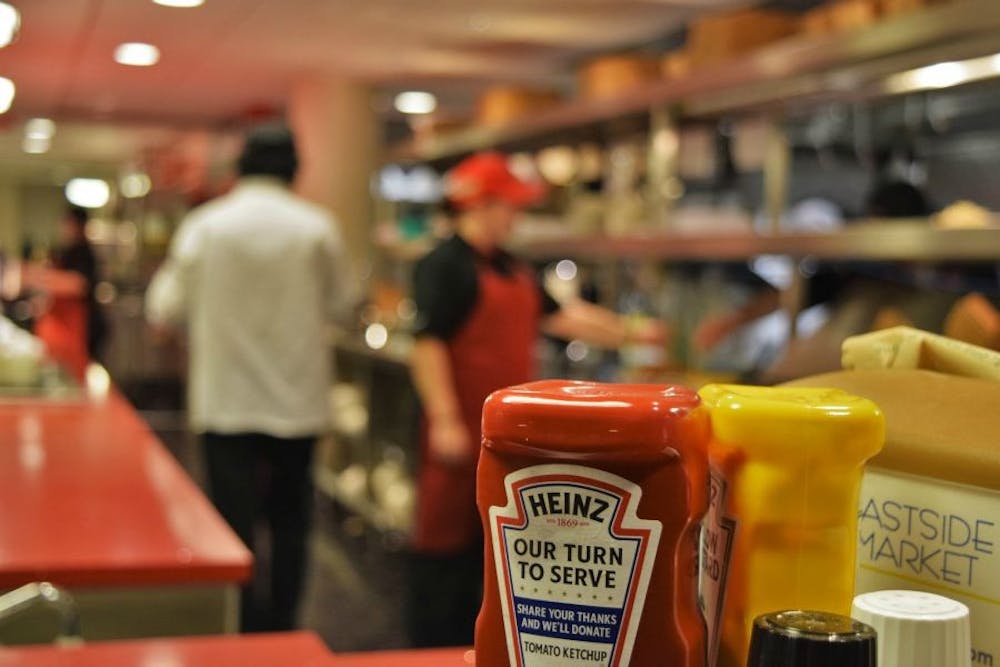By James Steinbauer, Opinion Editor
Oxford officials believe Miami University could be improperly disposing its food waste, putting unnecessary stress on the city's wastewater treatment plant.
This year, the city's treatment plant has experienced an increase in suspended solids - miniscule waste particles floating in water. Although small, these particles can have harmful consequences on Oxford's wastewater treatment plant.
The treatment plant was designed to process water with suspended solids levels around 250 mg/L and city sewage comes at or under this threshold. Samples from under Sycamore Street and Brookview Court show suspended solids levels of 255 mg/L and 190 mg/L, respectively.
Sewage from Miami dining facilities, however, contains levels nearly 10 times higher - 2,235 mg/L from Miami's Western Dining Hall and 1,700 mg/L from Garden Commons. Oxford Director of Public Services Michael Dreisbach said the amount of suspended solids was not as high last semester.
"Something has occurred between spring and fall semester to put the system out of whack and give us these increased numbers," he said. "Clearly, Miami's dining facilities are contributing to this problem."
Dreisbach said Miami's systems should be catching this waste long before it gets to the city's treatment plant.
"This waste should not be entering the sanitary system," he said. "It's prohibited and should be removed by their filters, but that does not appear to be working properly."
City officials are concerned because this influx of suspended solids is causing an imbalance in the heart of Oxford's wastewater treatment plant. Increased waste means an increase in biochemical oxygen demand (BOD), the amount of oxygen aerobic bacteria needs to break down organic matter in water.
In other words, without oxygen, iron will not rust - the same goes for the decomposition of food waste.
Oxford's wastewater treatment plant relies on this process. The plant uses a series of redwood slabs covered in aerobic bacteria that feed on and destroy microscopic waste particles in the water. If the balance between these bacteria and the waste's BOD is upset, the wastewater treatment plant could lose its federal permit.
The Clean Water Act requires that every municipal wastewater treatment plant obtain a permit that regulates the pollutants discharged into U.S. waters - in Oxford's case, the Four Mile Creek.
Enjoy what you're reading?
Signup for our newsletter
"We want to make certain, and I'm sure Miami does too, that the city does not violate its permit," Oxford City Manager Doug Elliot said. "It hasn't done that yet, but it has caused us some concern because our treatment plant was designed to handle residential waste, not napkins."
Elliott said that over time, the increased number in suspended solids would have an impact on the plant's performance and would cost the city more money. Dreisbach said the city should have been consulted on this issue before now.
However, Cody Powell, Miami's associate vice president of facilities, planning and operations, said Miami always works closely with the city.
"All of our projects are required to be reviewed by the city engineer's office," Powell said. "We have monthly meetings, we share information, they review the drawings, they comment and they let us know of things they want to be changed."
However, Oxford City Engineer Victor Popescu, surrounded by hundreds of blueprints and plans in his office, said not one of them concerned Miami's wastewater procedures.
"The only thing that I'm sure of is that I did not review anything that has to do with sewage that is produced, whether it is from toilets or food," Popescu said.
In many Miami dining halls on campus, food waste, napkins and the occasional stray fork are ground up in food disposals known as "pulpers." The remaining pulp, roughly the size of coarse coffee grounds, is rinsed with water. The water goes down the drain and the leftover pulp is put in the trash.
"All but one of those pieces of equipment were in place when the students left and the city didn't have a problem," Powell said.
That one machine is the new EnviroPure food waste disposal system at Miami's Garden Commons, a system Miami is testing out. This, city officials say, could be part of the difference between prior semesters and this one.
The EnviroPure works much like a human digestive system: Food waste is chewed in a pulper and pumped into a 600-gallon, stainless-steel refrigerator-looking vessel where it is mixed with biomix - a cocktail of B6 and B12 amino acids that accelerates the natural decomposition process. This mixture then goes down a drain where it mingles with the rest of Oxford's sewage.
If EnviroPure's test-run at Garden Commons succeeds, Miami will implement the system in dining halls across campus, like Maple Street, Armstrong Student Center and the Western Dining Commons.
Despite sampling by the city of Oxford, Powell said the source of the increased suspended solids is still unknown.
"The numbers that [the city] is sharing with us indicate that they have a huge amount of solids that exceed any type of level we could possibly produce," he said. "We don't even feed that much weight in pounds of food to students, much less throw it down the sanitary system."
However, Tina Rotundo, the executive manager at Garden Commons, said students' leftovers can add up pretty quickly.
"This machine is set up for 475 pounds of waste a day, but we're producing over 600 pounds," Rotundo said.
To accommodate the extra waste, Rotundo said Miami is going to add another 600-gallon tank to the EnviroPure system in Garden Commons.
Oxford and Miami are now working together to take daily sewage samples at dining facilities in an effort to locate the crux of the problem and, possibly, confirm city officials' suspicions. Powell, however, said that the university is doing nothing wrong.
"There is absolutely nothing for us to hide," Powell said.




